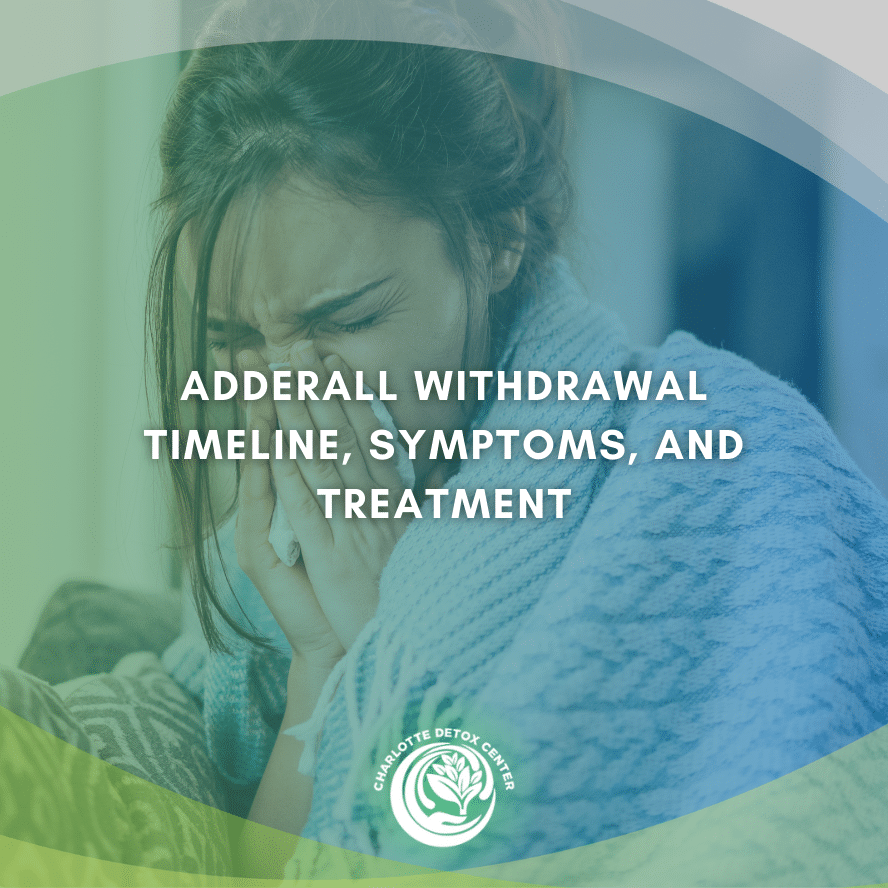Adderall Withdrawal Timeline, Symptoms, and Treatment

Medically Verified: 2/1/24
Medical Reviewer
Chief Editor

All of the information on this page has been reviewed and verified by a certified addiction professional.
Adderall is a prescription stimulant drug that is used to treat attention-deficit hyperactivity disorder (ADHD).[1] It helps people with ADHD improve their focus, lessen impulsive behaviors, and boost concentration levels. However, many people without ADHD abuse this substance to experience an energetic and euphoric high.
When abused, Adderall is known to be habit-forming and highly addictive. If you or a loved one regularly misuses Adderall, you could become dependent on it. Once your body is accustomed to the presence of it, you will experience withdrawal symptoms if you suddenly stop taking it.
Adderall addiction can cause withdrawal symptoms that are difficult to cope with. Not only that, but the Adderall withdrawal timeline can be unpredictable, so you should always seek help from a medical detox center.
What are the Symptoms of Adderall Withdrawal?
When you abuse Adderall, it increases the levels of dopamine and norepinephrine in your brain. As a result, your body will become dependent on it to produce these chemicals, causing you to become addicted. After regular use, stopping the use of Adderall suddenly will result in symptoms of withdrawal.
The symptoms of Adderall withdrawal may include:[2]
- Anxiety and restlessness
- Irritability or depression
- Trouble sleeping and insomnia
- Elevated heart rate
- Increased blood pressure
- Fatigue or drowsiness
- Panic attacks
- Suicidal thoughts
- Vivid dreams
- Increased appetite
- Difficulty thinking or concentrating
- Slowed movements or reflexes
- Headaches
- Cravings for Adderall
While the symptoms of Adderall withdrawal are usually not life-threatening, they can be incredibly difficult to cope with on your own. People who attempt to overcome Adderall withdrawal without the help of a medical detox program might relapse. Since they have lost the tolerance they had for Adderall, this could result in a life-threatening overdose.
The Adderall Withdrawal Timeline
Typically, the symptoms of Adderall withdrawal take a day or two to begin affecting you. In most cases, withdrawal symptoms will subside between 1 to 2 weeks after your last dose. However, the exact timeline for Adderall withdrawal can vary from person to person depending on the dose, frequency of use, and one’s overall health.
The general timeline for Adderall withdrawal is as follows:
Days 1 to 3
The initial symptoms of Adderall withdrawal will begin between the first 24 hours and 3 days after your last dose. These symptoms are usually mild, including things like insomnia, fatigue, depression, or increased anxiety.
Days 4 to 7
Between the 4th and 7th day of Adderall withdrawal, your symptoms will peak, which means they will be at their most severe. During this time, you should always be receiving care from a medical detox program. Peak symptoms of withdrawal may include irritability, anxiousness, restlessness, difficulty sleeping or concentrating, and extreme cravings to use Adderall.
Week 1 to 2
Sometime between the first and second week of Adderall withdrawal, symptoms like increased heart rate and blood pressure or impaired mental functioning should begin to subside. However, many people continue to deal with psychological symptoms like anxiety, insomnia, and depression.
Week 3
By week 3 of being off of Adderall, your symptoms should be completely gone. However, you are still at risk of relapsing and may continue to experience cravings
How is Adderall Withdrawal Treated?
When you arrive at a medical detox facility you will undergo an initial assessment to determine your needs throughout treatment. Medical staff will gather information about your substance abuse, mental health, physical health, and family history.
After the assessment, nurses and doctors will monitor your vital signs to ensure your heart rate and blood pressure remain at a healthy level. If you experience any issues, they will be promptly treated to ensure you remain medically stable.
While there are no medications currently approved for Adderall withdrawal, the medical team will provide you with medication specific to the symptoms you experience. For example, if you have severe symptoms of depression or anxiety you will be given medications to keep you comfortable and safe.
Once you have completed the withdrawal stage of recovery from Adderall addiction, you will be transferred into an inpatient or outpatient rehab center where you will undergo individual therapy, group counseling, and relapse prevention planning. These treatments will provide you with the coping skills and support you need to maintain long-term sobriety.
Get Connected to a Top-Rated Adderall Detox Program
If you or a loved one suffers from Adderall addiction, it’s time to seek professional help. Medical detox is always the first step in recovery, as it helps you safely and comfortably overcome withdrawal. At Charlotte Detox Center, we can provide you with the treatments, monitoring, and support necessary to help you remain focused in your recovery.
To learn more about our Adderall detox program, contact Charlotte Detox Center today.
References:
- The Food and Drug Administration (FDA): Adderall, Retrieved October 2023 From https://www.accessdata.fda.gov/drugsatfda_docs/label/2007/011522s040lbl.pdf
- The National Library of Medicine (NLM): Treatment for amphetamine withdrawal, Retrieved October 2023 From https://www.ncbi.nlm.nih.gov/pmc/articles/PMC7138250/
